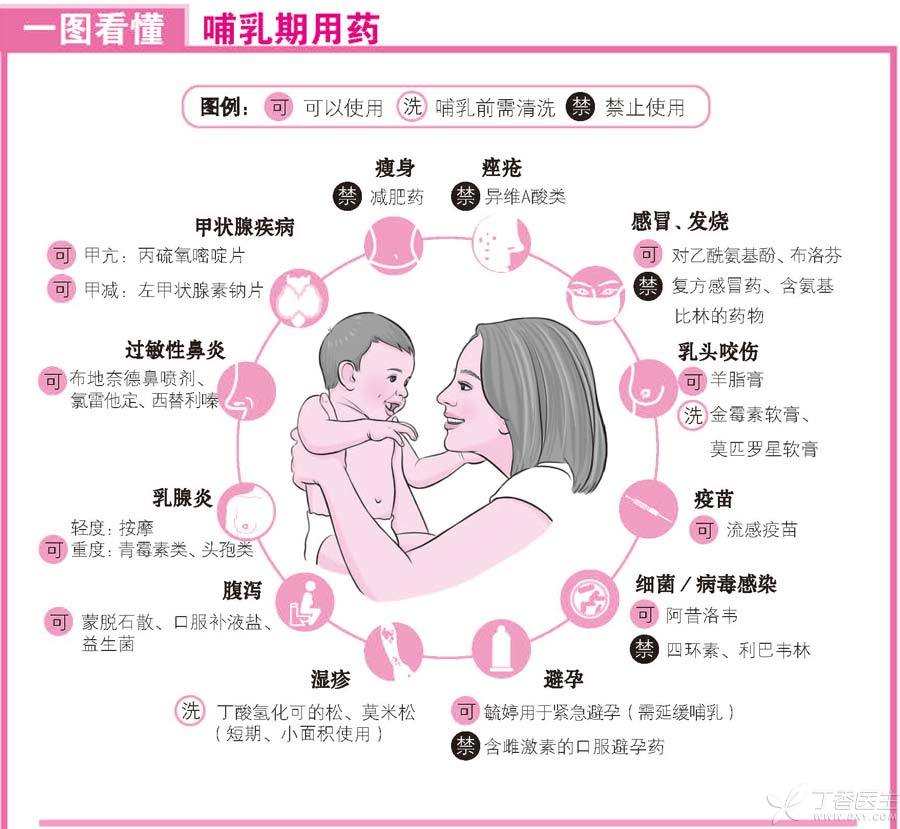
Breastfeeding can not only provide the baby with necessary nutrition, but also provide immunoglobulin from the mother to enhance the baby’s immunity.
In our country, doctors usually suggest that if conditions permit, the baby should be breast-fed for at least 6 months. In the United States, the Association of Pediatricians recommends mothers to breast-feed their babies until they are 1 year old. The World Health Organization recommends a longer period of time, up to the age of 2.
Breast-feeding mother is also an ordinary person, is the possibility of illness, and due to breast-feeding and other special factors, may be more likely to get some diseases. At this time, medication, worry will affect the baby, don’t medication, delay or serious symptoms, their discomfort, will indirectly affect the baby.
Here, senior pharmacist Ji Lianmei gave the vast number of nursing mothers a trick to solve the most common problem of nursing medication. See the following answer for details.
Q: Is it safer to use what medicine for breast-feeding mothers to catch a cold and have a fever?
A: More than 90% of colds are caused by virus infection. The virus has a natural clearance period in the human body. The human immune system will need about 3-5 days to produce specific antibodies to remove the virus from the body. In the process of antibody production, the human body will raise its body temperature to resist the virus, so fever is the normal defense response of the human body.
All you need to do is wait patiently, drink more water and rest more. This is the basic treatment strategy for the common cold. If your body temperature is above 38 ℃, you can choose acetaminophen or ibuprofen. They are the most widely used and safest antipyretic and are safe to use during lactation.
Q: What about diarrhea of breast-feeding mothers? Can I take medicine?
A: You can go to the hospital to check whether diarrhea is caused by bacterial infection. If so, the doctor will judge whether antibiotic treatment is needed and can prescribe some antibiotics that can be used during lactation. If it is caused by other reasons, then symptomatic treatment, such as montmorillonite powder to stop diarrhea, oral rehydration salt to replenish water and electrolyte; If diarrhea lasts for a long time, you can also take some probiotics to regulate intestinal flora, such as Peifikang, which is safe during lactation.
Q: What is better for calcium supplement during lactation?
A: The preferred supplement should be from the diet, Eat more calcium-rich foods, Such as dairy products, bean products, dark green vegetables, fish and fruits. When the diet cannot absorb enough calcium, you can take calcium under the guidance of a doctor. The most economical calcium carbonate can be used. It is more recommended to purchase drugs with the approval number of the Chinese medicine standard. Generally, the quality is more stable and the supervision of the drug administrative department is stricter.
Generally speaking, when choosing calcium, don’t pursue calcium tablets with a special amount of calcium, it is best to choose a small amount of 100 ~ 300 milligrams of calcium tablets, which can be eaten two or three times a day and several times a day. Excessive intake at one time will reduce the absorption rate and easily cause constipation. Small or chewable calcium tablets are also better than large calcium tablets and capsules to swallow.
In addition, vitamin D can help calcium absorb and utilize important components, so it is better to supplement them together.
Q: What drugs should be avoided during lactation?
(1) Ribavirin
Also known as ribavirin, it has definite teratogenic effect during pregnancy, and its safety during lactation is not supported by clinical data. Moreover, it takes several weeks for the drug to be completely removed from the body and should be avoided during lactation.
(2) Tetracycline antibiotics
In addition to tetracycline, this kind of antibiotics also includes aureomycin, doxycycline (also known as doxycycline), minocycline (also known as minocycline), etc. This kind of drug can enter the milk, if the nursing mother takes it for a long time, there is a risk of causing the baby to have tetracycline teeth (yellowing teeth).
(3) Oral contraceptives containing estrogen
The common contraceptives in the domestic market are mostly compound contraceptives, which usually contain two types of ingredients: progesterone and estrogen, such as Yousmin and Marvelon.
During lactation, contraceptives containing estrogen should be avoided as much as possible. Long-term administration will inhibit lactation and lead to a decrease in mother’s milk production. However, contraceptives containing only progesterone can be used.
(4) Aminopyrine-containing drugs
Drugs such as analgin, analgesic tablets and antongding are often used as antipyretic and analgesic drugs. Aminopyrine may cause serious adverse reactions and is generally banned in the world. No one should use such drugs to reduce fever.
Q: Can I apply medicine to nipple bites during lactation?
Almost every nursing mother has the experience of nipples being bitten by babies.
It is usually recommended to use [sheep fat ointment] to treat baby bites. This ointment is fine even if it is eaten by the baby.
If you can’t buy it, you can also apply a small amount of [Baiduobang] immediately after breast-feeding, and wash it before breast-feeding next time. Don’t let the baby eat it or the baby’s skin come into contact with it.
Q: Will the use of antibiotics to treat mastitis affect the baby?
A: If the mammary gland is seriously infected, Usually, bacterial infections are caused by nipples being bitten or blocked by babies, and antibiotics are needed for treatment at this time. The antibiotics commonly used to treat mastitis are penicillins or cephalosporins. Both drugs are safe to use during lactation and are recommended by the American Association of Pediatricians.
Lactating mothers take these antibiotics, It has little effect on nursing babies, Even if there is an impact, it may only affect the flora in the baby’s intestinal tract. If the antibiotics in the nursing mother accumulate to a certain amount, Some of them will enter the baby’s body through breast milk, which may reduce the number of probiotics in the baby’s intestinal tract. Therefore, mothers taking antibiotics should learn to observe carefully to see if the baby has diarrhea symptoms.
If it is only slight diarrhea, it means that the medicine has little effect on the baby, and the mother can continue to take the medicine. If the baby has severe diarrhea, it means that the drug has already had adverse effects on the baby. It is better not to breast-feed again or to switch to other kinds of antibiotics after consulting a doctor.
Q: Do I need to suspend lactation during antibiotic treatment of mastitis?
A: Many mothers ask, is it best to suspend breastfeeding at this stage? Is there a good way to let the mother breast-feed and minimize the harm to the baby?
Generally speaking, if mastitis is not serious enough to have to be hospitalized, the doctor strictly ordered to stop breast-feeding, can normal breast-feeding. However, many mothers will be conservative for safety. Even if the doctor prescribes safe drugs for her, she will also stop breast-feeding. In fact, this time can reduce the impact of drugs on the baby by adjusting the time of taking drugs.
Can be in the baby just drink milk, enter long sleep before taking medicine. When the baby wakes up, the peak period has passed, then the mother breast-feeding again, can reduce the harm of the medicine to the baby to the lowest. In addition, the mother should also pay attention to drinking more water after taking the medicine, which is conducive to faster metabolism of the medicine out of the body.

Q: Breastfeeding was suspended during medication. How often can breastfeeding continue?
A: Lactating mothers need to pay attention to the fact that, If you have to use unsafe drugs banned during lactation, Need to suspend breastfeeding. Even after the end of medication, the time to resume breastfeeding is also exquisite. According to the theory of drug clearance in the body, each drug will have its own half-life, usually indicated in the drug instructions. It is generally believed that after 5 half-life or so drugs can be completely removed from the body, breastfeeding can be resumed.
Take levofloxacin, an antibacterial drug, as an example. The half-life indicated in the instruction manual is 6 hours. After 5 half-lives, the drug is basically removed from the body. Therefore, by multiplying the half-life value of 6 by 5, it can be calculated that it takes about 30 hours for the drug to be completely removed from the body, that is to say, lactation can be resumed about 30 hours after taking the drug.
It should be noted that during the period of suspension of lactation, the breast must be emptied regularly by hand or breast pump, so as not to affect the lactation volume in the future.
Q: Will filming and anesthetics affect lactation?
A: Filming and looking at teeth during lactation make many mothers struggle. In fact, In the process of X-ray, CT and MRI, the body will bear certain radiation, but it will not affect the breastfeeding, the mother can not worry. Local anesthetics will be used in the process of filling teeth, but the local anesthetics used in filling teeth will be metabolized quickly in the body and will not affect the breast-fed baby.
Q: Can my mother still nurse with herpes zoster?
A: If breast-feeding mothers have herpes zoster, they should avoid intimate contact with their babies. Because the virus causing chickenpox and the virus causing herpes zoster are the same virus, which may infect the baby and lead to chickenpox.
However, acyclovir, which is used to treat herpes zoster, is safe during lactation.
Q: Can I use Dakenin for beriberi during lactation?
A: Dakenin can treat beriberi. Its effective ingredient is [miconazole nitrate]. This ingredient basically does not enter milk when applied externally, so local external application during lactation does not affect lactation.
Q: Postpartum urticaria recurs. How to treat it?
A: Urticaria is a common skin allergic disease. Postpartum, due to weak constitution, low immunity and large mood swings, it is easy to suffer from urticaria.
Before treatment should first look for allergens and avoid contact, otherwise it is easy to recur. Treatment can choose the second generation of antiallergic drugs loratadine or cetirizine, which is the first choice of lactation antiallergic drugs abroad, and cetirizine more than 6 months of baby can also symptomatic use, if loratadine is ineffective, can also try cetirizine.
Antipruritic can also use calamine lotion for lactation. Care should be paid attention to not scratching and not hot compress. Pay attention to light diet, drink more water, keep stool unobstructed and promote allergen discharge. Try to ensure adequate sleep on work and rest, and adjust mentality at the same time to avoid excessive mood swings.
Q: You must not breastfeed in what?
A: Breastfeeding is supposed to be a natural thing for every mother, but unfortunately, a few mothers suffering from the following diseases have to give up breastfeeding, for example:
(1) AIDS, tuberculosis, T cell virus infection and other infectious diseases.
(2) Drug addicts or alcoholics cannot breastfeed either, because this will make the baby poisoned or addicted to alcohol or drugs.
(3) If mothers who want to undergo cancer radiotherapy and chemotherapy should also pay attention to the fact that radioactive substances will be used during radiotherapy to decontaminate milk, which is not suitable for breast-feeding immediately and requires a period of time to breast-feed. For chemotherapy, because the metabolic time of each chemotherapy drug is different, it is necessary to consult oncologists and listen to more professional suggestions.
